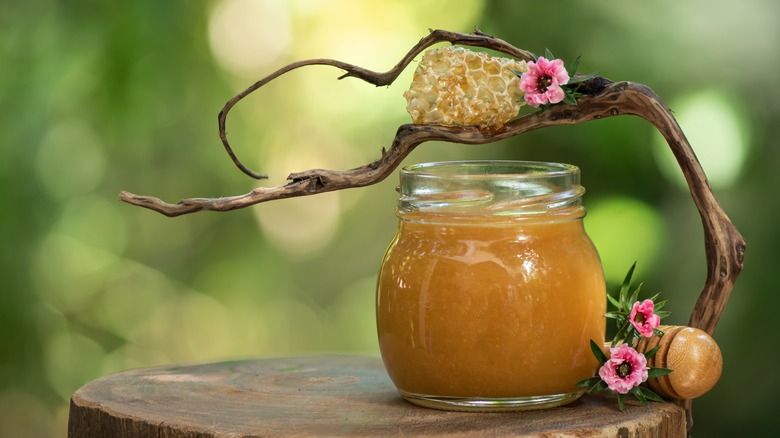Honey Might Have An Unexpected Effect On This Common Type Of Cancer
Honey adds that subtle touch of sweetness to your tea, toast, or pancakes. A little honey with lemon can help soothe a sore throat. Athletes like honey as a quick source of pre-workout energy to power through tough workouts. Unlike sugar, honey has a host of minerals and antioxidants that can boost your health.
In particular, manuka honey might be able to slow the growth of breast cancer cells by 84%, according to a 2024 study in Nutrients. The manuka honey seems to target breast cancer cells while leaving alone healthy breast cells. Manuka honey is more effective in treating estrogen receptor (ER)-positive breast cancer, which is the most common type of breast cancer. Tamoxifen, which is an estrogen blocker that treats breast cancer, can be more effective when supplemented with manuka honey.
Although the power of manuka honey to fight breast cancer is still in its preclinical stage, the study shows potential for treatment for breast cancer patients who don't respond to traditional treatments. "The findings provide hope for the development of a natural, less toxic alternative to traditional chemotherapy," said the study's first author and UCLA Associate Professor of Medicine Dr. Diana Marquez-Garban in a news release (via UCLA Health).
How manuka honey affects cancer cells
Manuka honey isn't the typical honey you find in grocery stores. Regular honey is often pasteurized and comes from bees that suck the nectar from tupelo trees, clover blossoms, or wildflowers. Manuka honey comes from the New Zealand manuka tree, and it has medicinal compounds such as methylglyoxal that regular honey often lacks. Manuka honey also has natural phytoestrogens, which are estrogen-like compounds found in plant foods. The polyphenols and flavonoids found in manuka honey have cancer-fighting properties.
The researchers treated ER-positive cancer, triple-negative cancer, and healthy breast cells with different concentrations of manuka honey in laboratory dishes. Although the triple-negative breast cancer cells were less responsive to the manuka honey, manuka honey triggered programmed cell death (called apoptosis) in the ER-positive cells. More manuka honey increased this effect. Manuka honey also activates a protein called AMPK that suppresses the growth of tumors. This anti-cancer effect of manuka honey was also found when the breast cancer cells were implanted in mice.
Manuka honey has other health benefits
Manuka honey has been found to arrest other types of cancer. A 2018 study in Food & Function studied manuka honey's effects on two types of colon cancer cells. Manuka honey had the same effect on colon cancer cells as breast cancer cells. It slowed down the growth of colon cancer, prohibited cell division, and caused apoptosis of harmful cells. Manuka honey was found to reduce the activity of proteins that help cancer cells survive.
The compounds luteolin, quercetin, galangin, and chrysin found in manuka honey partially block pathways that help cancer cells survive, according to a 2019 article in the International Journal of Molecular Sciences. This study tested manuka honey on both breast cancer and lung cancer cells.
Another medicinal benefit of manuka honey is its antibacterial power. The Food and Drug Administration approved manuka honey to prevent infections from wounds and burns. You might also find manuka honey to be good for your oral health. According to a 2018 article in AIMS Microbiology, manuka honey can fight strong pathogens, including the antibiotic-resistant bacteria MRSA. When shopping for authentic manuka honey, look for its Unique Manuka Factor (UMF) certification, which shows that the honey has passed rigorous quality-assurance testing.


